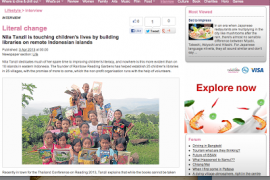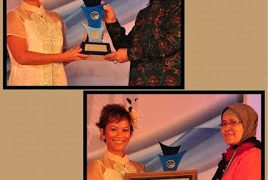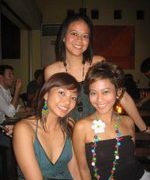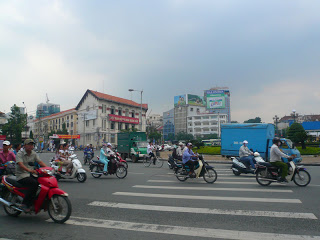This article is published in today’s The Star, the leading English daily newspaper in Malaysia
You’d be surprised what can be done with things that you would usually throw away without a second thought.By NILA TANZIL ENTERING a bookstore in South Jakarta, my eye is caught by a burst of colour in a corner. When I take a closer look, I discover funky looking makeup pouches, pencil cases, book covers, passport holders and laptop and sling bags – all made out of the packaging of well known brands of household products! I can’t help but smile as I recognise the packaging from my detergent on a pencil case…. There’s another reason to smile over these products that make use of discarded packaging: Currently, Jakarta generates approximately 28,000cu m of trash a day; the World Bank estimates that this will almost double, to approximately 50,000cu m a day, by 2010 (Kompas, Sept 16, 2006). This city – like most large cities today – desperately needs to reduce the amount of trash that ends up in its landfills.
 |
|
The XSProject Foundation in Jakarta help train economically disadvantaged women to generate income by training them to make unique products from discarded plastic packaging.
|
Which is why I’m delighted to meet the people at the XSProject Foundation, producer of those ingenious products. Founder, artist and environmentalist Ann Wiser enthusiastically explains the four-year-old foundation’s ideas. The first idea is to reduce the volume of non-recyclable plastic trash in Jakarta by re-using it. The foundation buys waste from the city’s trash pickers to stop it from ending up in landfills. Says the foundation’s daily operations manager, Yuniar Wulandari (aka Uni), “There are 80,000 tonnes of flexible plastic packaging manufactured each year in Indonesia. The average use of a single-use drink container made from this material is only four seconds. After that, it may sit in a landfill forever.” Most people do not know that this type of plastic is not recyclable, so it doesn’t have a market value – no one is interested in buying and re-using it so it will just end up in the dump. And manufacturers still use it for their packaging because it is cheaper. As a result, the amount of non-biodegradable plastic trash in the city’s dumps is increasing.
 |
|
Not bad for products made from trash! And they’re unique, too.
|
Another of the foundation’s ideas and a major part of its mission is to reduce poverty. Which is why it buys that waste from the city’s trash pickers at above the market price and then trains women from lower income groups to produce those funky products from it. For this activity, XSProject collaborates with a small NGO, Yayasan Kampung Kids, which provides training on how to make high quality handmade products, sewing techniques as well as designing patterns. Another part of the foundation’s mission is to raise awareness about environmental issues, especially among children. It works with several schools, from the elementary to junior high school levels, on this. Says Uni, “We start by giving them a shock therapy: showing a video of the environmental damage caused by trash.” They then share information on where the plastic trash comes from, what the kids can do to reduce its volume and how to manage waste by sorting it into different types – glass, plastic, metal, paper, etc – that can be recycled or re-used. The foundation’s project manager in charge of raising awareness in schools, Adit, then explains that, “We show them what can be made out of the non-biodegradable trash. Then we try to involve them by asking them to bring their own packaging wastes to the school. We provide several trash bins in each school. Students can throw the plastic waste from home into the XSProject trash bin.
 |
|
Sorting through discarded plastic packaging. If the foundation did not find a use for it, all that would end up in the city’s landfills.
|
“The children get excited when they see XSProject’s products. They feel involved in the whole project and they are proud to use pencil cases or bags that are made of the trash that they bring to the school,” Adit says enthusiastically. Adds Uni, “We want to make people look good and feel good at the same time when using our products. All profits from the sales go to the foundation to fund our programmes to increase the standard of living of the disadvantaged as well as to raise awareness on reducing plastic trash in the city.” It’s nice to know we can look cool while doing some good with these socially responsible products.
To order XSProject Foundation’s products or for more information, go to xsprojectgroup.com or e-mail info@xsprojectgroup.com. In Jakarta, the foundation’s products can be found in Aksara Bookstore, Kemang, and several art galleries in South Jakarta.






to all readers: confirm, this product is so cool! I walk in styles whenever I shop groceries with the shopping bags, hekekekekek… love ’em!
Dear Nila ..
I have total respect for the enviromentalists who go beyond their call of duties to make our mother earth a better place for us & the future generation.
My wife is so into recycling & we refused plastic bags when we shop!! I hope that we could focus my energy towards similar endeavours in the near future!!
cool stuffs.
trying to find it @ bdg.
@the razzler, i did same thing, mostly i refused plastic bag when go for shop, but then the seller will look at me like i was came from another planet. who care with her from-which-planet-this-buyer-come-from-looks, anyway?!
Am just trying reduce my trash, so far, only this that i can do for my environment.
nadia: hehehe… everytime i go shopping with XSProject’s bag, people will look at my bag (not look at me? ugh! hahaha..) and some of them even come to me and ask where to buy the bag! ;D
dear the razzler, yup, i did the same thing too… at least we can start from ourself first, right?
hi r,
unfortunately the product isn’t available in bandung yet.
however, if you’re interested, you can send them email directly 🙂
mbak-mbak XS hihihihihi …
🙂 now it’s easy for everyone to differentiate you & Karen. You have these colorful bags with you! 🙂
We have the bags in Australia now thanks to Nila.
Everyone here loves them too.
hanny, you’re such a l’il devil!
hi nila,
i still use the bag that you sent it and now my brother-in-law in darwin wanted too. it’s a very great idea and they are cute too. we are also hate plastic bag in here!
They’re everywhere in Sydney. Around $20 each. Not bad huh. I was amazed too when I first saw it. I thought the idea was very original, not only that it also helps the environment. It’s amazing what a creative mind can do. How much is it in Jkt?
If I’m not mistaken, in Jkt it’s around IDR 50.000 – 200.000, depending on the products. Right, Nil?
Waiting for your posting on COACH store opening 🙂
I think its cool to reuse a trash, but i’m afraid, if we produce a lot of trash, trash snak package which commonly consumed by the children, so its mean that our children become snack maniac depend on snack they consumed?
Wah..jeng nila, ….iya emang kalo org kreatif, sampah2 aja bisa jadi duit….! Btw, sekarang tulisan nya byk dimuat di The Star yah?? Wah proud to know u, girl!
Ah,lo sok keren!
Nila,
Humanis banget 🙂
Kind Regards
AH
http://groups.yahoo.com/group/Forum-Pembaca-Kompas/
Wow, that is really a great idea. Everybody should make contribution, big or small, to help preserve the environment. I think this bag-making using discarded plastic can be a good hobby. I haven’t heard of this before and I’m contemplating on taking it up now! 🙂 Got to get a sewing machine first 🙂
Honestly i don’t really like about that bag.
But i think that is the best answer to stop or maybe minimalis global warming.
So creative.